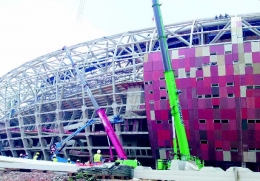The world’s biggest sporting event comes to South Africa in 2010. But is the country ready for the World Cup? Charlie Johnson investigates
Whichever nation takes the Fifa World Cup in 2010 will have won four years of bragging rights in the world soccer arena. But even if it isn’t South Africa clutching the trophy next summer, many expect the ‘rainbow nation’ to be the real winners.
For the first time in history, the world’s largest sporting event will be hosted by an African nation, and many Africans and non-Africans alike see the 2010 World Cup as a coming-out party for a continent long ravished by the ghosts of racism and colonialism, and still battling the demons left behind.
“It is a continent that has given us so much and it’s time to give it something in return,” said Fifa president Sepp Blatter. “I believe that it was a moral obligation of ours to give the World Cup to the Africans.”
And it would appear that South Africans in particular are elated to have the World Cup on their soil.
Benitha Bonthuys, a South African who has lived in Ireland for over a year, says that the run-up to the tournament is only creating more and more buzz as the kick-off draws closer.
“My family says they’re just surrounded by the cup like four to five hours a day,” she says. “As a country, it means a lot to us. We are looking to welcome people from around the world and show them South Africa.”
Beyond the ‘first time ever’ significance of the event for Africans, there are other reasons for this excitement that can’t be measured in terms of historical significance alone. Major international sporting events like the World Cup can create economic windfalls for their host nations. Visitors flock in droves to fill up hotels, dine at restaurants and spend in shops, which creates a surplus of jobs for local workers. With an unemployment rate of around 24 per cent, new jobs – even temporary ones – will help to fill a widening gap in the South African economy.
And the work is not limited merely to the weeks of the tournament. There are new facilities to be built, roads to widen and security checkpoints to maintain. Several stadiums are in the process of being constructed or renovated for the competition. It is hoped that these improvements will lead to increased development and investment for South Africa in years to come.
But it would be unfair to say that the World Cup’s only significance will be for an actuary’s ledger. With thousands set to visit and millions expected to watch the competition, many see an opportunity to educate the world about the often-misunderstood African continent.
“The World Cup will be able to dispel the idea that there isn’t more to Africa than just Nigeria and South Africa,” said Ken McCue of Sport Against Racism Ireland (Sari).
“Africa really isn’t well understood. I think the only time many Irish hear about Africa is when the Trócaire box comes around at Easter.”
Bonthuys agrees: “People have this notion of Africa as being so poor and desolate. [But] we want people to see that we are trying and we can be world-class. We want them to see that we are like any other country in the west.”
Yet despite all the positives, there have been some bumps in the road. Some worry that the country will not be able to handle the influx of visitors, or protect them from the crime that often overshadows such large events.
Moreover, recent labour strikes involving tens of thousands of construction workers have slowed the completion of new stadiums and renovations.
“I think the workers finally realised they were working on something so important, but getting paid so little, far less than workers building World Cup stadiums in other countries,” says Bonthuys.
“I think in some ways we’ve begun to like the idea of hosting the cup less and less just because there have been so many headaches.”
But while these headaches may have put something of a damper on South Africa’s lofty expectations, the cons still seem to be dwarfed by the pros.
In one year’s time, South Africa will be hosting an event that less than two decades ago they would have been banned from competing in due to the apartheid government. And it seems that all South Africans – both at home and abroad – are intent on celebrating the changes that have come since.
“It’s a great thing to be hosting the cup,” adds Benitha Bonthuys. “It’s an amazing unifying force. Sport is one of the few things we can all agree on.”
So even if Bafana Bafana may be a long shot for the trophy after the final whistle has blown in Johannesburg, the people of South Africa might just be the real champions of the world come 2010.












